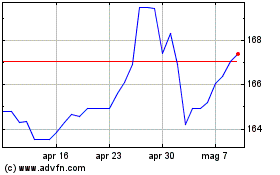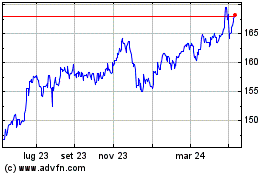Euro Slides Amid Risk Aversion On Trump Fears
18 Maggio 2017 - 7:41AM
RTTF2
The euro fell against its key counterparts in early European
deals on Thursday, as European shares followed Asian shares lower,
after political uncertainty in Washington stoked concern about the
ability of the U.S. President Donald Trump to push through his
reform agenda.
Besieged from all sides, the Trump administration appointed
former FBI Director Robert Mueller as a special counsel to oversee
the federal investigation into Russia's involvement in the U.S.
presidential election last year.
That followed a report from The New York Times that former FBI
Director James Comey had composed a memorandum recording the
President's request to drop an investigation of Michael Flynn, the
former national security adviser.
With Trump facing the threat of impeachment, traders fear that
the agenda of tax cuts and deregulation could be delayed.
The German yields also fell, with the benchmark yield on 10-year
note falling 0.33 percent. Yields move inversely to bond
prices.
In an interview, the European Central Bank member Benoit Coeure
told that the bank should be prepared to alter its monetary policy
stance when economic conditions improve, or else that would result
in a financial setback once it begins policy normalisation.
"Too much gradualism in monetary policy bears the risk of larger
market adjustments when the decision is eventually taken," Coeure
added.
The euro showed mixed performance against its major rivals in
the Asian session. While the euro rose against the greenback and
the yen, it held steady against the pound and the franc.
The euro hit near a 2-week low of 122.93 against the yen, down
from an early high of 124.11. If the euro-yen pair extends slide,
122.00 is likely seen as its next support level.
Preliminary data from the Cabinet Office showed that Japan's
gross domestic product gained 0.5 percent on quarter in the first
three months of 2017.
That was in line with expectations and up from 0.3 percent in
the previous three months.
The single currency reversed from an early high of 0.8610
against the pound, edging down to a 2-day low of 0.8535. The next
possible support for euro is seen around the 0.845 region.
Figures from the Office for National Statistics showed that UK
retail sales recovered at a faster than expected pace in April.
Retail sales volume including auto fuel grew 2.3 percent
month-on-month, reversing a 1.4 percent drop in March. This was the
fastest growth since January 2016, and above the expected rate of
1.1 percent.
The euro pared gains to 1.0893 against the Swiss franc, from a
high of 1.0928 hit at 6:15 pm ET. Continuation of the euro's
downtrend may see it challenging support around the 1.08 mark.
The euro retreated to 1.1120 against the greenback, from an
early 6-month high of 1.1172. On the downside, the euro is likely
target 1.10 as the next support level.
The euro slipped to a 2-day low of 1.6024 against the kiwi,
compared to 1.6073 hit late New York Wednesday. The euro is seen
finding support around the 1.58 area.
Looking ahead, the U.S. weekly jobless claims for the week ended
May 13, leading indicators for April and Philadelphia Fed
manufacturing survey for May are slated for release in the New York
session.
At 8:30 am ET, the European Central Bank executive board member
Yves Mersch gives keynote address at Government Borrowers Forum
hosted by the European Stability Mechanism and the Ministry of
Finance of Luxembourg in Luxembourg.
At 8:45 am ET, the European Central Bank executive board member
Sabine Lautenschläger speaks at the IBF Board meeting organised by
Bundesverband deutscher Banken in Berlin, Germany.
The European Central Bank President Mario Draghi speaks at the
Tel Aviv University in Tel Aviv, Israel, at 1:00 pm ET.
Cleveland Fed President Loretta Mester speaks on economy and
monetary policy before the Economic Club of Minnesota at 1:15 pm
ET.
Grafico Cross Euro vs Yen (FX:EURJPY)
Da Mar 2024 a Apr 2024

Grafico Cross Euro vs Yen (FX:EURJPY)
Da Apr 2023 a Apr 2024
